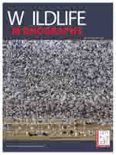
WILDLIFE MONOGRAPHS
Scope & Guideline
Pioneering insights for a sustainable future in wildlife.
Introduction
Aims and Scopes
- Wildlife Ecology and Behavior:
Research focused on the ecological dynamics and behaviors of various wildlife species, including their interactions with ecosystems and responses to environmental changes. - Conservation Management Strategies:
Studies that explore effective management practices for wildlife conservation, including the impacts of human activities such as hunting and land use on wildlife populations. - Habitat Assessment and Restoration:
Research assessing habitat quality and restoration efforts to support wildlife populations, emphasizing the importance of habitat in conservation planning. - Population Dynamics and Genetics:
Investigations into the population dynamics, genetics, and health of wildlife species, particularly those that are endangered or threatened. - Human-Wildlife Interactions:
Studies examining the complex relationships between humans and wildlife, including the effects of human activities on wildlife behavior and population health.
Trending and Emerging
- Impact of Climate Change on Wildlife:
An increasing number of studies are focusing on how climate change affects wildlife populations and habitats, indicating a growing recognition of this critical issue within the field. - Ecological Interactions and Food Web Dynamics:
Research exploring the intricate relationships between species, such as predator-prey dynamics and competition, is gaining traction, underscoring the importance of ecological interactions in conservation. - Technological Innovations in Wildlife Monitoring:
There is a notable trend towards employing advanced technologies such as distance sampling and genetic tools for monitoring wildlife populations, enhancing data accuracy and management strategies. - Human Impact Mitigation Strategies:
Emerging studies are focusing on effective strategies to mitigate human impacts on wildlife, reflecting a shift in conservation practices towards more sustainable human-wildlife coexistence. - Behavioral Adaptations to Environmental Change:
Research is increasingly examining how wildlife species adapt behaviors in response to environmental changes, highlighting the need for adaptive management strategies.
Declining or Waning
- Traditional Hunting Studies:
While hunting remains a relevant topic, research focused solely on traditional hunting practices without considering broader ecological impacts appears to be less frequent, indicating a shift towards more integrative studies. - Generalized Species Assessments:
There seems to be a waning focus on generalized assessments of species without specific contextual studies, as the journal increasingly favors detailed, context-driven research. - Static Habitat Studies:
Research that examines habitats in isolation, without considering dynamic ecological interactions or changes over time, is becoming less prominent in favor of studies that address habitat dynamics and management.
Similar Journals

CANADIAN JOURNAL OF ZOOLOGY
Innovating Insights in Animal Biology and EnvironmentWelcome to the Canadian Journal of Zoology, a leading academic journal in the fields of Animal Science and Zoology as well as Ecology, Evolution, Behavior and Systematics. Published by Canadian Science Publishing since 1965, this esteemed journal serves as a vital platform for researchers, professionals, and students to disseminate and engage with significant findings in zoological and ecological research. With an impact factor placing it in the Q2 category and rankings reflecting its influence (201/490 in Animal Science and Zoology; 372/721 in Ecology), the journal is committed to advancing the understanding of animal biology and environmental interactions. Although currently not an open access publication, it provides comprehensive resources and studies that are crucial for the academic community. Based in Ottawa, Canada, the journal continues to push the boundary of knowledge right up to 2024 and beyond, making it an essential resource for anyone dedicated to the life sciences.
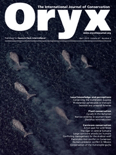
ORYX
Fostering Collaboration in Ecology and EvolutionORYX, published by Cambridge University Press, stands as a prestigious scholarly journal in the fields of Ecology, Evolution, and Conservation. With an ISSN of 0030-6053 and E-ISSN 1365-3008, this journal has been a critical platform for researchers and professionals since its inception in 1950. Recognized for its excellence, ORYX ranks in the Q1 quartile for both Ecology, Evolution, Behavior and Systematics and Nature and Landscape Conservation as of 2023, highlighting its influential contributions to the field. With a strong focus on disseminating innovative research and fostering collaboration among scientists, the journal covers a broad array of topics, from biodiversity and ecosystem services to conservation strategies and policy implications. As a result, ORYX provides invaluable insights that help shape the future of environmental science. Its impressive Scopus rankings place it in the top 80th percentile in its categories, further underscoring its importance and appeal among academics, professionals, and students alike.

Journal of Zoo and Aquarium Research
Empowering professionals with cutting-edge insights in animal care.Journal of Zoo and Aquarium Research is an esteemed publication dedicated to advancing the field of zoology and aquatic sciences. Published by the European Association of Zoos & Aquaria (EAZA), this journal provides a dynamic platform for sharing groundbreaking research, best practices, and conservation efforts within zoos and aquariums, making it an invaluable resource for researchers, professionals, and students alike. With an increasing focus on the importance of biodiversity and sustainable practices, the journal is committed to fostering scholarly communication that enhances the understanding of animal care, species conservation, and habitat preservation. Although specific metrics such as impact factor and HIndex are currently unavailable, the journal's rigorous peer-review process ensures that only high-quality research is disseminated. As an open-access publication, the Journal of Zoo and Aquarium Research promotes accessibility to vital information, encouraging a broader engagement with critical issues in wildlife conservation. By addressing contemporary challenges in the field, this journal stands as a pivotal resource for those dedicated to promoting animal welfare and ecological sustainability.

Human-Wildlife Interactions
Fostering Sustainable Coexistence Between People and Wildlife.Human-Wildlife Interactions, published by the JACK H BERRYMAN INST, is a leading open-access journal dedicated to the critical study and understanding of the complex relationships between humans and wildlife. Launched in 2007, the journal has become a pivotal platform for researchers, practitioners, and students in the fields of ecology and conservation. It is based in the heart of ecological research at Utah State University, bringing together diverse perspectives that illuminate both the challenges and solutions associated with wildlife interactions. With an impact factor reflected in its respectable Q3 ranking in Ecology and Nature and Landscape Conservation, it demonstrates a solid contribution to these scientific domains. Researchers exploring innovative conservation strategies, wildlife management practices, and the socio-economic impacts of wildlife are encouraged to submit their studies, enhancing the journal's role in fostering dialogue and advancing knowledge in this vital area of environmental science. Accessible to a global audience, Human-Wildlife Interactions continues to promote scholarly discourse in a way that supports the sustainable coexistence of people and wildlife in our shared environments.

CALIFORNIA FISH AND GAME
Pioneering Research in Animal and Aquatic SciencesCalifornia Fish and Game is a prominent journal dedicated to the fields of Animal Science and Aquatic Science, published by the California Fish and Game Editor. With its roots extending back to 1979, the journal has served as a vital platform for disseminating research focused on the wildlife and aquatic ecosystems of California and beyond. Recognized within the Q4 quartile for both Animal Science and Zoology and Aquatic Science, it provides critical insights and scholarly contributions, despite its comparative rankings within the respective categories. The journal, with an ISSN of 0008-1078 and an E-ISSN of 2331-0405, offers an invaluable resource for researchers, professionals, and students alike, looking to deepen their understanding of California's rich biodiversity and ecological challenges. For those interested in open access options, further details can be reviewed through the journal's platform. By fostering a community of inquiry, California Fish and Game plays an essential role in advancing knowledge and conservation efforts in the fields of interest.

AUSTRALIAN JOURNAL OF ZOOLOGY
Exploring the Rich Tapestry of Animal LifeAustralian Journal of Zoology, published by CSIRO PUBLISHING, serves as a premier platform for research in the fields of animal science and zoology, with a profound commitment to advancing our understanding of wildlife and ecosystems. Featuring an ISSN of 0004-959X and an E-ISSN of 1446-5698, this esteemed journal encompasses a wide range of topics relevant to ecology, evolution, behavior, and systematics. For the year 2023, it holds a commendable Q2 ranking in both Animal Science and Zoology and Ecology, Evolution, Behavior, and Systematics, demonstrating its significant impact within the academic community. With a rich publication history spanning from 1952 to 2024, the journal caters to researchers, professionals, and students by disseminating crucial findings and methodologies that contribute to effective conservation efforts and informed ecological practices. Although not an open access journal, it continues to foster collaboration and discussion among scholars in Australia and beyond. Located in Clayton, Victoria, the journal remains dedicated to its objective of enhancing knowledge in zoological sciences and addressing vital environmental challenges.

JOURNAL OF WILDLIFE MANAGEMENT
Advancing sustainable practices for wildlife conservation.Welcome to the Journal of Wildlife Management, a premier publication dedicated to advancing the science and practice of wildlife management. Published by Wiley, this journal spans decades of impactful research and has been a cornerstone in the fields of Ecology, Evolution, Behavior, and Nature and Landscape Conservation. With an impressive ranking in the Q1 quartile across multiple disciplines, it provides a crucial platform for interdisciplinary collaboration and dissemination of knowledge among researchers, practitioners, and policy-makers. Covering a wide range of topics pertinent to wildlife management, this journal promotes innovative techniques and sustainable practices that are essential in addressing contemporary ecological challenges. The Journal of Wildlife Management is rigorously peer-reviewed, ensuring high standards of quality and relevance, making it an invaluable resource for those committed to conservation and ecological research.
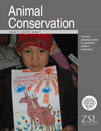
ANIMAL CONSERVATION
Championing Research for the Future of Wildlife.Animal Conservation is a prestigious journal that serves as a vital platform for the dissemination of research dedicated to the preservation of wildlife and habitats. Published by Wiley, this journal has established a significant presence in the fields of Ecology and Nature and Landscape Conservation, holding a distinguished Q1 category ranking for both in 2023. With an impressive Scopus rank of #25 in the realm of environmental science, it caters to a global audience keen on understanding and addressing pressing conservation issues. The journal provides researchers, professionals, and students with high-quality, peer-reviewed articles that explore innovative methods and strategies in animal conservation. With its continuous publication since 1998, encompassing a comprehensive range of topics, Animal Conservation is indispensable for anyone aiming to make impactful contributions to the field of ecology and conservation biology.
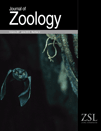
JOURNAL OF ZOOLOGY
Exploring the wonders of zoological sciences since 1830.JOURNAL OF ZOOLOGY, published by Wiley, stands as a premier scholarly journal in the fields of Animal Science and Zoology, renowned for its outstanding contributions to the knowledge of animal biology and ecology. With an impressive impact factor and a strong ranking in the Q1 category for Animal Science and Zoology, as well as Q2 for Ecology, Evolution, Behavior, and Systematics, the journal rigorously engages with both foundational research and groundbreaking discoveries since its inception in 1830. Located in Hoboken, New Jersey, this journal is dedicated to fostering the academic community's understanding of zoological sciences, providing access to important research that shapes wildlife conservation efforts and ecological studies. Although the journal does not currently offer open access options, it continues to attract significant attention, as evidenced by its strong Scopus rankings in related categories. Researchers, professionals, and students will find invaluable resources in the JOURNAL OF ZOOLOGY to advance their understanding of animal life and the ecological challenges it faces today.
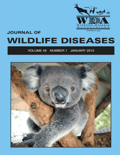
JOURNAL OF WILDLIFE DISEASES
Connecting research and conservation for a sustainable future.JOURNAL OF WILDLIFE DISEASES, published by the WILDLIFE DISEASE ASSOCIATION, INC, is a premier, peer-reviewed journal dedicated to advancing the understanding of wildlife diseases and their implications for ecosystems and public health. Since its inception in 1970, this journal has served as a crucial platform for researchers and professionals within the fields of ecology and wildlife management, currently maintaining a credible Q2 ranking in Ecology and a Q3 ranking in Ecology, Evolution, Behavior and Systematics as of 2023. With an ISSN of 0090-3558 and an E-ISSN of 1943-3700, the journal encompasses a wide range of topics, from disease dynamics to the conservation of wildlife populations. This journal is recognized for its valuable contributions to the ecological and environmental sciences, supporting evidence-based approaches to wildlife management. While it does not offer open access, the JOURNAL OF WILDLIFE DISEASES continues to impact the scientific community and policy-making through its rigorous publications. As such, it remains an essential resource for those committed to understanding and addressing the complex challenges of wildlife health.